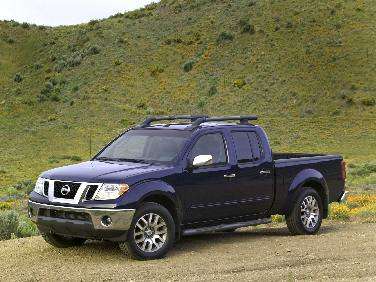Recent Articles
Popular Makes
Body Types
Why Nissan's Millionth Frontier Is Important

Nissan says it is close to building its millionth Frontier pickup at the Smyrna, Tennessee facility. So before Nissan hits its milestone, let's take a look at just how much Nissan has contributed to the truck culture in the U.S.
America has had an unofficial love affair with the small truck. Domestic manufacturers found most of their early success by welding truck beds onto the rear end of their sedans and giving them adventurous names like Ranchero and El Camino. The import brands used their smaller car origins to create even smaller pickups. In the 1960s everyone from Subaru to Volkswagen had a petite pickup, the latter being successful enough for the government to take notice.
VW's Type 2 truck was catching enough sales that it became collateral in the "Chicken Tax" of 1963. The Chicken Tax included a 25% markup on imported trucks valued at over $1,000. This was part of retaliation against some European countries, including West Germany, for imposing higher taxes on U.S. chickens. The intended target was VW, but caught in the middle of this was Nissan (then known as Datsun over here.)
At the time of the Chicken Tax, Datsun sold more cars than trucks in all regions west of the Mississippi River. Like many of the Japanese manufacturers, the simple construction of Datsun's trucks meant that they would not have to give up this profitable segment in the face of this hefty tax. Datsun would continue to import trucks, but the truck bed would be brought in separately. The two pieces of the truck would be reunited near the port of entry so that they were considered assembled in the U.S. The public never saw their small trucks leave the boat a "chassis cabs", and this extra assembly only added a small amount to the customer's selling price.
The small trucks were Datsun's gateway into North America. Consumers were a little reluctant to buy passenger cars from this somewhat unknown brand. But trucks were a different story. These Datsuns proved popular as a utilitarian and rugged vehicle that fit a specific need. With VW unable to import their trucks as chassis cabs, Datsun to was able capture 39% of the U.S. import truck market by 1965 -- only five years into running its own North American operations. Datsun eventually grew the public's acceptance of its passenger cars on the reputation of durable trucks.
By the time the first oil crisis hit in 1973, Datsun trucks had buoyed the entire vehicle line to where it was well situated to solidify its reputation for building dependable and fuel-efficient vehicles. During this time Datsun branched off into offering more options like extended beds. It even reintroduced the extended cab option to small trucks, which had been missing since VW's trucks disappeared from these shores.
The truck laws would change by 1980. Import companies could no longer bolt on truck beds to get around the tax law, but that was not much of a problem for Datsun who already had plans for a U.S. truck factory in the works. In the summer of 1983, a 720 pickup was the first vehicle to roll off the assembly line at the factory in Smyrna, Tennessee. This new truck had a new brand name: Nissan.
These trucks would continue to be popular through the rest of the 1980s. By 1986 Nissan's annual small truck sales were about 100,000. A quarter century later, that number has fallen by more than half for Nissan's latest truck, the Frontier. Those are still respectable figures, but the decline is likely a reflection of a bygone era. The small pickup earned its popularity by not only being versatile, but also as an extremely cheap and easy alternative for a second car and/or young buyers (there was once a time when the rear bumper was part of the optional equipment.)
Today most small pickups have lost their original spirit of being a pure utilitarian. For example the Frontier has grown out of a small truck and into more of a mid-size class. It can be purchased with a 4.0-liter 261 hp V-6, and the single cab is no longer available. But some of Nissan's practical truck heart remains. You can still get a bare-bones Nissan Frontier King Cab starting at $18,200 before rebates.
Small trucks have helped make Nissan a household name in the U.S. These pickups have been a fixture for over forty years, and if the millionth Frontier milestone is any indication, they will likely continue to be a company icon well into the future.